SCUBA News 241
(ISSN 1476-8011)
28 July 2020
~~~~~~~~~~~~~~~~~~~~~~~~~~~~
SCUBA News (ISSN 1476-8011)
Issue 241 - July 2020
https://www.scubatravel.co.uk
~~~~~~~~~~~~~~~~~~~~~~~~~~~~~
Thank you for subscribing to SCUBA News.
Contents:
What's new at SCUBA Travel?
Dolphin talk
Diving news from around the World
Download as a pdf file
What's New at SCUBA Travel?
 |
Croatia has 66 inhabited islands and much of the best diving is off these. EU, EEA and UK nationals can freely enter.
|
AquaMarine Diving - Bali
10% off published prices, free rental gear and an AquaMarine Goodie-Bundle when you use code ScubaTravelUK2020 at
AquaMarineDiving.com
Dolphin Talk
by Poppy Reay-Robinson
With their large brains dolphins have many factors in common with humans and great apes.
Dolphins communicate primarily audibly. Whilst the sounds themselves are easy to record the actual meaning of the noises and what the role of it is, is more difficult to decipher.
Whistling Dolphin
Some members of the dolphin family don't produce whistles whilst for others it is very important for communication.

Each bottlenose dolphin (the most commonly studied dolphin) produces a signature whistle and that comprises a large proportion of the vocal noises it makes.
These signature whistles are most commonly heard when a dolphin is isolated from the rest of the pod, when making contact with others or by a mother frequently whistling to help her calf recognise her.

Dolphins develop their signature whistle early. The process by which a young dolphin chooses its call is still unknown: they appear to learn parts from other dolphins.
They're able to recognise signature whistles of associates they've encountered over periods of more than 20 years.
They also copy other dolphins signature whistles which seems to call other dolphins, much like how humans use names. In fact, dolphins can also precisely replicate human-made whistles.
The large amount of non signature whistles need much more studying.
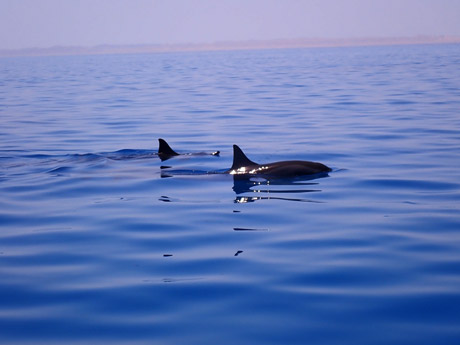
Pops - Courtship and Aggression
Dolphins also produce low frequency "pops" which are linked to echolocation.
"Pops" with higher frequencies are associated with male courtships of females. More frequent pops with head jerks from males are aggression towards other males.
It's similar to birds with males whistling to attract females whilst repelling other males.
Non-Verbal Signs
Like humans, dolphins effectively communicate without vocal sound. Tail slaps - hitting the water with their tails - produce a loud sound and shock waves that can stun fish. This behaviour is a warning. In County Clare on the west coast of Ireland is a lone dolphin - "Dusty". She is often friendly and interacts with people, especially those she knows. But when strangers swim up to her and get too close she can become agitated. Like a dog baring its teeth, Dusty slaps the water to show that she is not happy. In 2013, when her signals were ignored, she attacked a swimmer causing serious injury.
It was Dusty who sparked my lifelong interest in dolphins. When I was around 8 years old I was paddling in the sea at Fanore when Dusty swam up right next to me. She was gentle and let me stroke her and I have been fascinated with dolphins ever since.
Diving News From Around the World
Our round up of the best underwater news stories of the past month. For breaking news see our Twitter page or RSS feed
 |
Sharks 'extinct' on 20% of world's reefs
|
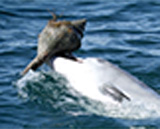 |
Shelling out for dinner - dolphins learn foraging skills from peers
|
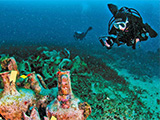 |
Greece opens its first underwater museum
|
 |
Young dolphins pick their friends wisely
|
 |
The masks you throw away could end up killing a whale
|
 |
In Cell Studies, Seaweed Extract Outperforms Remdesivir in Blocking COVID-19 Virus
|
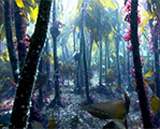 |
Kelp found off Scotland dates back 16,000 years to last ice age
|
 |
Artificial night sky poses serious threat to coastal species
|
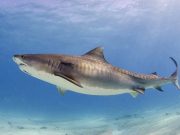 |
Revealed: Tiger sharks' travels and preferred hangouts in the Gulf of Mexico
|
SCUBA News is licensed under a Creative Commons Attribution 4.0 Unported License. This means we are happy for you to reuse our material for both commercial and non-commercial use as long as you: credit the name of the author, link back to the SCUBA Travel website and say if you have made any changes. Some of the photos though, might be copyright the photographer. If in doubt please get in touch.
Photo credits: Tim Nicholson, Jill Studholme, Kristin Riser, Jianye Sui
Previous editions of SCUBA News are archived at https://www.scubatravel.co.uk/news.html
SUBSCRIBING AND UNSUBSCRIBING
Visit [UNSUBSCRIBE] and add or remove your e-mail
address. To change whether your receive the newsletter
in text or HTML (with pictures) format visit [PREFERENCES]
ADVERTISING
Should you wish to advertise in SCUBA News, please
see the special offers at
https://www.scubatravel.co.uk/newsad.html
Other advertising opportunities are at
https://www.scubatravel.co.uk/advertising.html
CONTACTING THE EDITOR
Please send your letters or press releases to:
Jill Studholme
SCUBA News
The Cliff
DE6 2HR
UK
news@scubatravel.co.uk
PUBLISHER
SCUBA Travel, 5 Loxford Court, Hulme, Manchester, M15 6AF, UK
Subscribe To SCUBA News
Our newsletter, SCUBA News (ISSN 1476-8011), is absolutely free. It is a monthly publication, delivered by e-mail. To receive your copy fill in your details below. We will never pass your e-mail address to any third parties, or send you unsolicited e-mail.
To receive your copy fill in your details below. We will never pass your e-mail address to any third parties, or send you unsolicited e-mail.
You will receive an e-mail confirming your subscription. If you don't receive this you may have entered your e-mail address incorrectly - revisit this page and re-subscribe.
Write to SCUBA News
We love hearing from you: send us any news, dive write ups, reviews or comments




